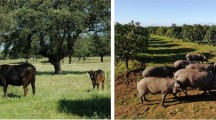Abstract
Livestock farming is one of the main energy consumers in agriculture. It consumes about 20% of all energy consumption. The half of these consumption (50%) is consumed by cattle farms. The energy consumption of the livestock production is about 16%. More than 75% of the energy is consumed to produce feed and is subsequently concentrated in animal waste. Improving the energy efficiency of livestock farming is an important scientific and economic issue. The improvement of food production results in the development of monocultures. This rule refers to all spheres of husbandry human activity. In order to solve a contradiction between agricultural production and the nature laws there has been paid a great attention to the organization of agro-ecosystems. The maintenance of permanent functioning of agroecosystems requires significant energy consumption. The study of energy consumption in agroecosystems is one of the main research methods in ecology, therefore, the current paper has considered the energy-environmental problems of livestock farming from these points of view. The current study carried out on the basis of the energy balance of the livestock complex has shown that the energy efficiency of livestock production was not more than 16%. This factor promotes a great raise of environmental issues. There has been proposed to reduce “energy capacity” of animal waste to increase environmental safety and energy independence of livestock farming.
Access this chapter
Tax calculation will be finalised at checkout
Purchases are for personal use only
Similar content being viewed by others
References
Mindrin, A.S.: Energoekonomicheskaya ocenka sel'skohozyajstvennoj produkcii [Energy-economic assessment of agricultural products], 187 p (1987)
Bulatkin, G.A.: Analiz potokov energii v agroekosistemah [Analysis of energy flows in agroecosystems]. Vestnik Rossijskoj Akademii Nauk tom 82(8), 1–9 (2012)
Perez-Neira, D., Soler-Montiel, M., Gutierrez-Pena, R., et al.: Energy assessment pastoral dairy goat husbandry from an agroecological economics perspective. A case study in Andalusia (Spain). Sustainability 10 (2018). Article number: 2838.
Guzman, G.I., de Gonzalez, M.G.: Energy efficiency in agrarian systems from an agroecological perspective. Agroecology Sustain. Food Syst. 39, 924–952 (2015)
Pozdnyakov, A.V., Semenova, K.A., Fuzella, T.Sh.: Energeticheskij analiz funkcionirovaniya agroekosistem v usloviyah estestvennogo nasyshcheniya-pervye rezul'taty [Energy analysis of the functioning of agroecosystems in conditions of natural saturation - first results]. Uspekhi sovremennogo estestvoznaniya (2), 124‒128 (2018)
da Silva, N.F., da Costa, A.O., Henriques, R.M., Pereira, M.G., Vasconcelos, M.A.F.: Energy planning: Brazilian potential of generation of electric power from urban solid wastes—under “waste production liturgy” point of view. Energy Power Eng. 7(5), 193 (2015)
Mishurov, N.P.: Metodologicheskie osnovy energeticheskoj ocenki proizvodstva moloka [Methodological foundations of energy assessment of milk production]. Tekhnika i oborudovanie dlya sela (5), 16‒19 (2017)
Sibagatullin, F.S., Sharafutdinov, G.S., Shajdullin, R.R., Moskvichyova, A.B.: Bioenergeticheskaya ocenka i osnovnye puti snizheniya energoemkosti proizvodstva produkcii zhivotnovodstva [Bioenergy assessment and main ways to reduce energy intensity of livestock production]. Uchenye zapiski Kazanskoj gosudarstvennoj akademii veterinarnoj mediciny im. N.E. Baumana T. 216, 295–302 (2013)
Rajaniemi, M., Jokiniemi, T., Alakukku, L., et al.: Electric energy consumption of milking process on some Finnish dairy farms. Agric. Food Sci. 26, 160–172 (2017)
Fuzella, T.Sh.: Energeticheskaya ocenka funkcionirovaniya agroekosistemy (na primere SPK «Nelyubino») [Energy assessment of the functioning of the agroecosystem (on the example of the SEC "Ne-Lyubino")]. Vestnik Tomskogo gosudarstvennogo universiteta vypusk (326), 203‒207 (2009)
Stavi, I., Lal, R.: Agriculture and greenhouse gases, a common tragedy. A review. . Agron. Sustain. Dev. 33, 275–289 (2013)
Ghosh, S., Das, T.K., Sharma, D., Gupta, K., et al.: Potential of conservation agriculture for ecosystem services. Indian J. Agric. Sci. 89, 1572–1579 (2019)
Marks-Bielska, R., Marks, M., Babuchowska, K., et al.: Influence of progress in sciences and technology on agroecosystems. In: Conference: Geographic Information Systems Conference and Exhibition (GIS Odyssey), Trento, Italy, 04–08 September 2017, pp. 254‒263 (2017)
Lachuga, Yu.F., Vasilyev, A.N.: Napravleniya issledovanij v bioenergetike [Research areas in bioenergy]. Vestnik Rossijskoj sel'skohozyajstvennoj nauki (2), 4‒7 (2015)
Vasilyev, A.N.: Reshenie energo-ekologicheskih problem zhivotnovodcheskoj agroekosistemy [Solution of energy and environmental problems of livestock agroecosystem]. Tekhnologii i tekhnicheskie sredstva mekhanizirovannogo proizvodstva produkcii rastenievodstva i zhivotnovodstva (88), 19‒25 (2016)
Lehtonen, H.: Evaluating adaptation and the production development of Finnish agriculture in climate and global change. Agric. Food Sci. 24, 219–234 (2015)
Mancini, F.N., Milano, J., de Araujo, J.G., et al.: Energy potential waste in the state parana (Brazil) Brazilian archives of biology and technology 62 (2019)
Aberilla, J.M., Gallego-Schmid, A., Adisa, A.: Environmental sustainability of small-scale biomass power technologies for agricultural communities in developing countries. Renew. Energy 141, 493–506 (2019)
Sui, Y., Vlaeminck, S.E.: Dunaliella microalgae for nutritional protein: an undervalued asset. Trends Biotechnol. 38, 10–12 (2020)
Kavran, M., Cupina, A.I., Zgomba, M., et al.: Edible insects - safe food for humans and livestock. In: Scientific Meeting on Ecological and Economic Significance of Fauna of Serbia. Ecological and Economic Significance of Fauna of Serbia Book Series, Belgrade, Serbia, 17 November 2016, vol. 171, pp. 251‒300. Serbian Academy of Sciences and Arts Scientific Meetings (2018)
Author information
Authors and Affiliations
Corresponding author
Editor information
Editors and Affiliations
Rights and permissions
Copyright information
© 2021 The Author(s), under exclusive license to Springer Nature Switzerland AG
About this paper
Cite this paper
Vasiliev, A.N., Samarin, G.N., Vasiliev, A.A., Belov, A.A. (2021). Isolated Agroecosystems as a Way to Solve the Problems of Feed, Ecology and Energy Supply of Livestock Farming. In: Vasant, P., Zelinka, I., Weber, GW. (eds) Intelligent Computing and Optimization. ICO 2020. Advances in Intelligent Systems and Computing, vol 1324. Springer, Cham. https://doi.org/10.1007/978-3-030-68154-8_5
Download citation
DOI: https://doi.org/10.1007/978-3-030-68154-8_5
Published:
Publisher Name: Springer, Cham
Print ISBN: 978-3-030-68153-1
Online ISBN: 978-3-030-68154-8
eBook Packages: Intelligent Technologies and RoboticsIntelligent Technologies and Robotics (R0)




